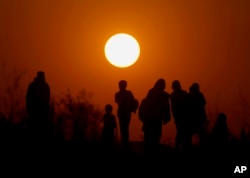Scientists in developing nations are considering ways to limit the effects of climate change on Earth. These scientists plan to explore one possibility: controlling or restricting sunshine levels. They want to see if use of a man-made chemical to block sunlight would be less risky than a rise in surface temperatures.
This area of study is called “solar geo-engineering.” Researchers believe that using the right chemical or chemicals might produce the same effect in Earth’s atmosphere as a big volcanic explosion. They think it could cool surface temperatures by hiding the sun with a cloud of ash.
Currently, solar geo-engineering is being studied mainly in industrial nations and by universities such as Harvard and Oxford.
Twelve scientists from developing countries say poor people are most likely to be affected by climate change. And they think the poor should be more involved.
“Developing countries must lead on solar geo-engineering research,” they said.
Nature magazine published a commentary written by the scientists. They are from countries such as Bangladesh, Brazil, China, Ethiopia, India, Jamaica and Thailand.
Atiq Rahman is head of the Bangladesh Centre for Advanced Studies. He said the idea of solar geo-engineering is unusual, but slowly growing in popularity in the world of research. He spoke by telephone with the Reuters news agency.
A new $400,000 research project may prove helpful to solar geo-engineering studies. It has urged scientists to request financing for their studies.
The project is called the Solar Radiation Management Governance Initiative (SRMGI). It receives help from the Open Philanthropy Project, a group supported by Dustin Moskovitz, a co-founder of Facebook, and his wife, Cari Tuna, the scientists wrote.
The project could help scientists in developing nations study the effects of solar geo-engineering on floods and dry weather, said Andy Parker, a project director of the SRMGI.
Rahman said he and the other scientists were not saying that geo-engineering would work. Among the ideas: airplanes might release shiny sulfur particles high in the Earth’s atmosphere.
“It is too early to know what its effects would be: it could be very helpful or very harmful,” the 12 specialists wrote, adding that many are against the idea.
A group of United Nations climate experts also have questions about solar geo-engineering and its effectiveness in fighting climate change. Their comments appear in a leaked copy of a report about climate change set for release in October.
Rahman noted that most developed nations have not kept their promises to reduce greenhouse gas emissions. Studies have linked those gases, such as carbon dioxide, to rising temperatures.
For that reason, Rahman said, the other possible ways to limit warming must be explored. The world is set for a warming of three degrees Celsius, he said, far above a goal of keeping a rise in temperatures “well below” two degrees Celsius. That target was set under the 2015 Paris Agreement.
I'm Susan Shand.
This story was adapted by Susan Shand from an original Reuters report. It was edited by George Grow.
_______________________________________________________________
Words in This Story
solar – adj. involving or about the sun
geo-engineer – v. to change the earth with natural materials
philanthropy – n. the practice of giving money and time to help make life better for other people
emission – n. the act of producing or releasing something, such as a gas






